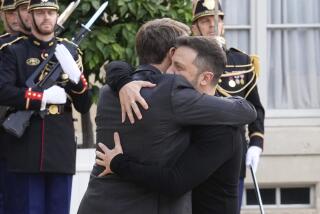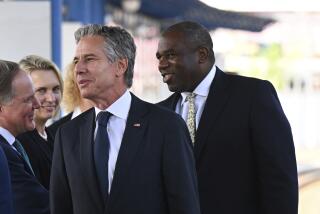Yeltsin Urges Britain, France, China Arms Cuts
LONDON — Russian President Boris N. Yeltsin on Thursday urged second-tier nuclear powers Britain, France and China to join the United States and Russia in announcing plans for new cuts in their nuclear arsenals.
Landing in London’s fog and cold on the first leg of a trip West that will take him next to the United States and Canada, Yeltsin, appearing healthy, mixed evangelical disarmament messages with pleas for help in achieving the economic reforms he has begun in his country.
Making his first major journey overseas since the collapse of the Soviet Union, Yeltsin reassured Western powers by saying again that Russian missiles aimed at Europe and the United States need to be “re-targeted.” This prompted a rash of premature British television and radio headline announcements proclaiming: “Russian Missiles No Longer Aimed at British Cities.”
“In the past, the United States, the United Kingdom and Europe in general were considered as potential enemies,” Yeltsin said during a press conference after meeting with British Prime Minister John Major. “That doctrine has to be changed and the missiles re-targeted. The missiles that remain after cuts and demolition should be used only as a deterrent.”
But he also warned of a potential “general unrest” and return to the gloomy Communist era of the past if reforms he has begun in Russia are not successful.
“Should the reforms fail, we shall face a new leadership which will reverse the progress that we have so far achieved, and Russia will fall into the abyss in which it has been for 74 years,” he said.
Yeltsin’s “good news-bad news” performance--on his first stop before heading off for meetings in New York with fellow heads of government on the U.N. Security Council and with President Bush at Camp David--may set the tone for more than a week of travel. He is scheduled to conclude his overseas journey with a separate three-day visit to France Feb. 5-7.
The Russian leader’s stop in London was marked by a historic agreement between two European allies of long ago who had drifted apart during the old Soviet Union’s Communist years.
After four hours of meetings, Russian and British leaders signed a broad, 14-point, joint declaration that Major described as “a new page” in Anglo-Russian relations.
The declaration outlined a “partnership in the ‘90s” in which there were “no ideological barriers, and no political impediments” separating the two countries. The two leaders stated that their nuclear arsenals were “for defensive purposes only” and would no longer be targeted at each other’s territory.
British officials said that the joint declaration is the foundation for an eventual treaty that will be the first since 1766, when the Russians and English signed a mutual defense pact against France.
On arrival in London, Yeltsin said he hopes Britain would abandon plans to upgrade its nuclear submarine fleet with four new multiple-warhead Trident missile submarines.
Major, however, refused to promise any change in the controversial missile program, saying nevertheless that it would be used “only as a minimum strategic force.” Both Britain and France, Western Europe’s only two nuclear powers, have said their arsenals are too small, relative to those of the United States and Russia, to reduce without risking their value as deterrent forces.
And China dismissed Yeltsin’s call, saying Beijing will join disarmament efforts only after the major powers have scaled down to its level.
“China possesses a very small number of nuclear weapons, and they are entirely for defense purposes,” Foreign Ministry spokesman Duan Jin told a weekly news briefing in Beijing, the Associated Press reported.
Responding to questions after his talk with Major, Yeltsin admonished reporters not to exaggerate differences between Britain and Russia on questions of disarmament.
“Mr. Major made his position clear and I respect it,” Yeltsin said as he departed the prime minister’s residence en route to a private meeting with former Prime Minister Margaret Thatcher. “I hope we shall not blow this matter out of proportion in the mass media.”
The controversy over the Tridents, designed to replace the aging British fleet of Polaris missile submarines, was the only rough spot in a day that Yeltsin dedicated to thanking Major and the British government for its support during the attempted Soviet putsch last August.
Only a handful of demonstrators--animal rights activists protesting against Russian slaughter of seal pups in the Siberian Arctic--greeted Yeltsin outside the prime minister’s official residence.
Yeltsin’s requests for economic help were met with some success as Major pledged to continue the British-led push for Russian entry into the International Monetary Fund by April. Contingent on Russia’s acceptance by the IMF, said Major, was a British pledge of $523-million in medium-term export credit for 1992.
In his capacity as the incoming president of the European Community, a position that rotates every six months among the members of the 12 EC nations, Major pledged to make “improved trade and cooperation with Russia” a European priority.
The Russian leader looked poised and confident in his dealings with Major and journalists. Appearing shy and much less comfortable was his wife, Anastasia (Naya), an engineer by profession who seldom makes public appearances.
“She doesn’t like cameras,” Yeltsin explained as the First Lady of Russia nervously posed for hundreds of photographers, flinching each time their flash guns fired.
Major, whose Conservative Party government faces elections as early as April, took pains to remind journalists that he was the first Western leader to publicly “denounce the coup” in Moscow last August. The two leaders reminisced briefly about their Aug. 19 telephone conversation during the attempted overthrow of the government of then-Soviet President Mikhail S. Gorbachev.
Major and Yeltsin also agreed to establish a secure telephone link between their respective offices. “I do not see this as a crisis hot line,” Major said. “It will reflect the growing number of shared issues and interests that we will wish to discuss.”
Asked by reporters about his recent 24-hour “disappearance” from Moscow, where on Monday the Russian leader abruptly canceled appointments and left the capital for an unannounced destination, Yeltsin laughed and cited an adaptation of a famous line from Mark Twain: “Reports of my demise have been slightly exaggerated.”
The Russian leader was mostly in good humor but assumed a slightly menacing tone when he discussed, through a translator, economic problems faced by his country.
“Russia has taken off its Communist shackles,” he said. “Now it is embarked on the civilized road of economic reform.
“We are going through hard times right now,” he said, “but we hope to stabilize the economy by the end of the year.”
Before leaving London, Yeltsin visited the former Soviet--now Russian--embassy, where he met with Thatcher and Labor Party Leader Neal Kinnock.
Thatcher, who remains a required stop for most heads of state visiting Britain despite her loss of leadership of the ruling Conservative Party, said Yeltsin talked about the need for support during the rough period of economic reforms.
“What they really need to know now is that there is an assurance of help,” she said.
Times staff writer Carey Goldberg contributed to this story from Moscow.
More to Read
Sign up for Essential California
The most important California stories and recommendations in your inbox every morning.
You may occasionally receive promotional content from the Los Angeles Times.










